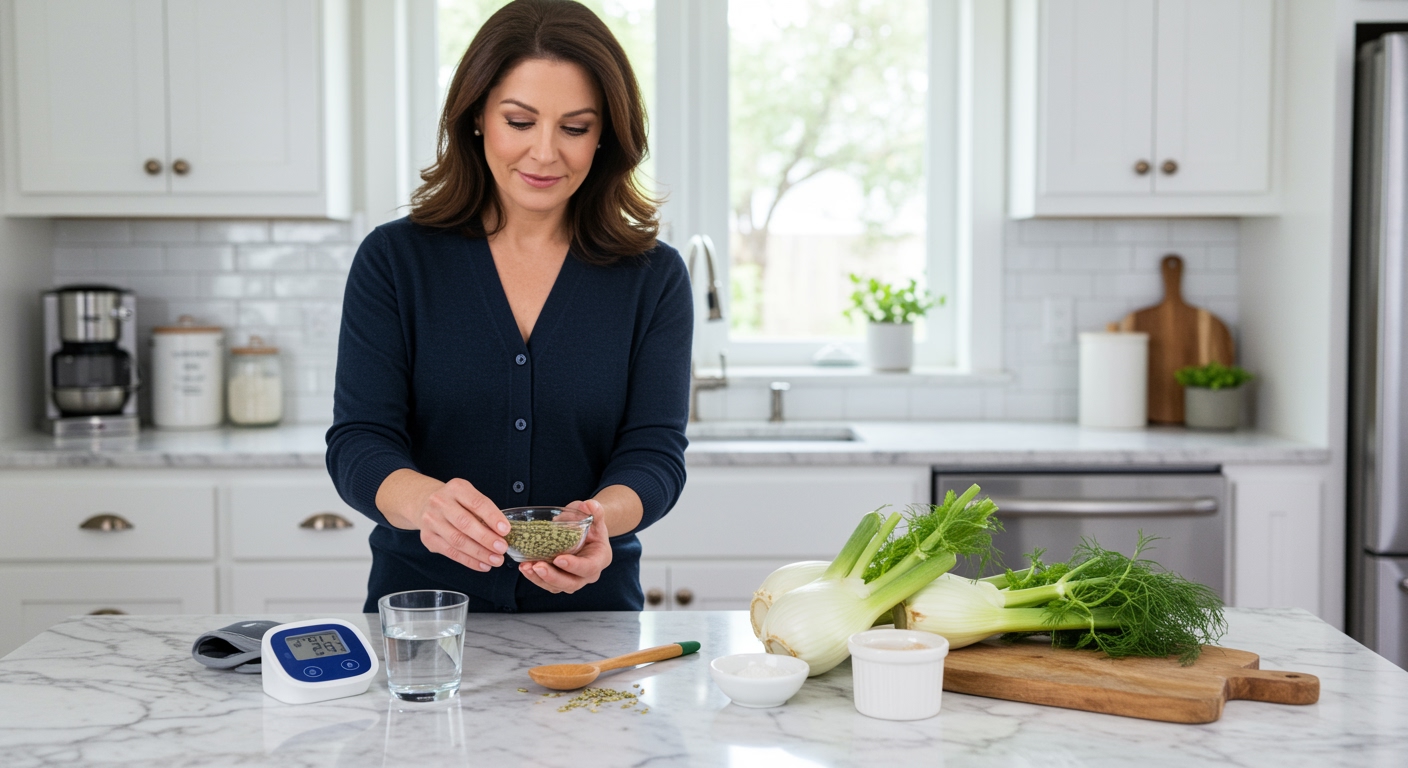✪ Key Takeaway: Fennel seeds can help manage blood pressure through potassium content and compounds that relax blood vessels naturally.
Introduction
Your grandmother probably kept fennel seeds in her kitchen without knowing they could help control blood pressure.
You might be wondering about fennel seeds because your doctor mentioned natural ways to support heart health, or perhaps someone told you these tiny seeds pack surprising benefits for blood pressure management.
Hi, I’m Abdur, your nutrition coach, and today I’m going to explain exactly how fennel seeds affect your blood pressure and whether they deserve a place in your daily routine.
What Makes Fennel Seeds Special for Blood Pressure?
Fennel seeds contain potassium, a mineral that directly counters sodium’s blood pressure-raising effects in your body.
When you consume adequate potassium, your kidneys excrete more sodium through urine, which reduces the volume of fluid in your blood vessels.
These seeds also contain calcium and magnesium, two minerals that help your blood vessel walls relax and contract properly.
The fiber in fennel seeds supports overall cardiovascular health by helping maintain healthy cholesterol levels, which indirectly benefits blood pressure.
Research shows that people who consume more potassium-rich foods like fennel seeds tend to have lower blood pressure readings over time.
✪ Fact: One tablespoon of fennel seeds provides about 120mg of potassium, contributing to your daily mineral needs.
How Do the Active Compounds Work?
Fennel seeds contain anethole, a compound that gives them their distinctive licorice-like flavor and provides cardiovascular benefits.
This compound helps relax smooth muscle in your blood vessel walls, allowing them to widen and reduce pressure on your circulatory system.
The seeds also contain flavonoids, plant compounds that act as natural antioxidants and support healthy blood vessel function.
These flavonoids help protect your blood vessels from damage caused by free radicals, which can contribute to high blood pressure over time.
Studies indicate that regular consumption of foods rich in these compounds can help maintain healthy blood pressure levels in people with mild hypertension.
The combination of minerals and plant compounds creates a synergistic effect that supports your cardiovascular system naturally.
✪ Pro Tip: Chew fennel seeds slowly after meals to maximize absorption of their beneficial compounds.
What Does the Research Actually Say?
A recent study published in medical journals found that people who consumed fennel seed extract showed modest reductions in both systolic and diastolic blood pressure.
The research involved participants with mild to moderate hypertension who took fennel seed preparations for several weeks.
Scientists discovered that the blood vessel relaxation effects occurred through calcium channel blocking mechanisms, similar to some prescription medications but much milder.
However, the studies used concentrated extracts rather than whole seeds, which means you would need to consume larger amounts of seeds to achieve similar effects.
Most research shows that fennel seeds work best as part of an overall heart-healthy lifestyle rather than as a standalone treatment for high blood pressure.
The evidence suggests these seeds can provide supportive benefits but should not replace proven medical treatments for hypertension.
✪ Note: Research studies typically use standardized extracts that concentrate the active compounds found in whole seeds.
How Should You Use Fennel Seeds Practically?
Start with one teaspoon of fennel seeds daily, either chewed directly or steeped in hot water as tea.
You can add ground fennel seeds to your cooking, especially in dishes with tomatoes, fish, or vegetables where their flavor complements the food naturally.
Many people find that chewing fennel seeds after meals helps with digestion while providing the cardiovascular benefits over time.
For tea preparation, steep one teaspoon of crushed fennel seeds in hot water for 10-15 minutes, then strain and drink once or twice daily.
Remember that fennel seeds work gradually, so you need consistent consumption over weeks or months to notice any blood pressure effects.
Always monitor your blood pressure regularly if you have hypertension, regardless of which natural remedies you try.
✪ Pro Tip: Buy whole fennel seeds and grind them fresh to preserve their potent compounds and maximize health benefits.
Are There Any Risks or Limitations?
Fennel seeds are generally safe for most people when consumed in normal culinary amounts.
However, some individuals may experience allergic reactions, especially if they have sensitivities to plants in the carrot family.
People taking blood pressure medications should consult their doctor before adding large amounts of fennel seeds to their diet, as the combination might lower blood pressure too much.
Fennel seeds contain compounds that can interact with certain medications, particularly blood thinners and hormone-sensitive treatments.
Pregnant women should limit fennel seed consumption because high amounts may stimulate uterine contractions.
The most important limitation is that fennel seeds provide modest effects compared to proven medical treatments for high blood pressure.
✪ Note: Never replace prescribed blood pressure medications with fennel seeds without medical supervision and approval.
The Bottom Line
Fennel seeds can contribute to blood pressure management through their potassium content and blood vessel-relaxing compounds, but they work best as part of a comprehensive heart-healthy approach.
Small daily habits with proven foods often create bigger health changes than searching for miracle cures.
I would love to hear about your experience with fennel seeds or any questions you have about natural approaches to blood pressure management in the comments below.
References
At NutritionCrown, we use quality and credible sources to ensure our content is accurate and trustworthy. Below are the sources referenced in creating this article:
- NDTV Food: High Blood Pressure Problem? Here’s Why You Should Include Fennel Or Saunf In Your Diet
- UC Irvine School of Medicine: New UCI study explains molecular mechanism of botanical folk medicines used to treat hypertension
- PubMed: Fennel seed extract effects on blood pressure
- Medical News Today: Fennel: Health benefits, facts, research





